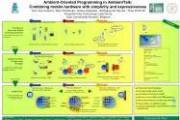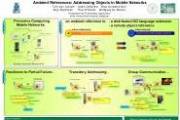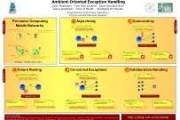This is an old revision of the document!
Posters
This page provides an overview of the various posters related to Ambient-Oriented Programming. A pdf version of each poster is available, together with a brief abstract describing it.
Ambient-Oriented Programming in AmbientTalk
 Abstract Software development for mobile devices (such as smart phones and PDA’s) is given a new impetus with the advent of mobile networks. Mobile networks surround a mobile device
equipped with wireless technology and are demarcated dynamically as users move about. Mobile networks turn the applications running on mobile devices from mere isolated programs into
smart applications that can cooperate with their environment. Recently, this vision has been termed Ambient Intelligence (AmI for short) by the European Council's IST Advisory Group.
Connections in mobile networks are volatile (because the communication range of the wireless technology is limited) and the network topology is open (because devices can appear and disappear unheraldedly). Developing application software for mobile networks still remains difficult because programming languages lack abstractions that deal with these mobile hardware characteristics. This observation justifies the need for a new Ambient-Oriented Programming paradigm (AmOP for short) that consists of programming languages that explicitly incorporate
potential network failures in the very heart of their basic computational steps. The poster ilustrates the design of the distributed programming language AmbientTalk, a first scion of this AmOP programming language family. AmbientTalk offers the programmer features to deal with the conceptual properties of wireless networks without having to deal with their technological characteristics.
Abstract Software development for mobile devices (such as smart phones and PDA’s) is given a new impetus with the advent of mobile networks. Mobile networks surround a mobile device
equipped with wireless technology and are demarcated dynamically as users move about. Mobile networks turn the applications running on mobile devices from mere isolated programs into
smart applications that can cooperate with their environment. Recently, this vision has been termed Ambient Intelligence (AmI for short) by the European Council's IST Advisory Group.
Connections in mobile networks are volatile (because the communication range of the wireless technology is limited) and the network topology is open (because devices can appear and disappear unheraldedly). Developing application software for mobile networks still remains difficult because programming languages lack abstractions that deal with these mobile hardware characteristics. This observation justifies the need for a new Ambient-Oriented Programming paradigm (AmOP for short) that consists of programming languages that explicitly incorporate
potential network failures in the very heart of their basic computational steps. The poster ilustrates the design of the distributed programming language AmbientTalk, a first scion of this AmOP programming language family. AmbientTalk offers the programmer features to deal with the conceptual properties of wireless networks without having to deal with their technological characteristics.
On display at OOPSLA 2005, ECOOP 2006
Ambient References: Addressing Objects in Mobile Networks
 Abstract A significant body of research in ubiquitous computing deals with
mobile networks, i.e. networks of mobile devices interconnected
by wireless communication links. Due to the very nature of such
mobile networks, addressing and communicating with remote objects
is significantly more difficult than in their fixed counterparts.
This poster describes ambient references, a novel remote object referencing abstraction in the context of such mobile networks. Remote object references are one of the most fundamental programming abstractions of any distributed object-oriented programming language. The poster describes why novel referencing abstractions are needed and describes the benefits of ambient references over classic remote object references in mobile networks.
Abstract A significant body of research in ubiquitous computing deals with
mobile networks, i.e. networks of mobile devices interconnected
by wireless communication links. Due to the very nature of such
mobile networks, addressing and communicating with remote objects
is significantly more difficult than in their fixed counterparts.
This poster describes ambient references, a novel remote object referencing abstraction in the context of such mobile networks. Remote object references are one of the most fundamental programming abstractions of any distributed object-oriented programming language. The poster describes why novel referencing abstractions are needed and describes the benefits of ambient references over classic remote object references in mobile networks.
On display at ECOOP 2006
Ambient-Oriented Exception Handling
 Abstract Exception handling mechanisms are essential parts of current-day programming language because they provide a clean mechanism to separate the handling of exceptional events from default behaviour. In the context of mobile ad hoc networks, the increasing probability of exceptional events (such as disconnections, software mobility, changing environmental conditions) clearly necessitates the introduction of adequate support to handle exceptions. This poster presents a systematic analysis of the requirements for an exception handling mechanism for mobile ad hoc networks and outlines how these criteria can be mapped onto a set of easily implementable and reusable language constructs.
Abstract Exception handling mechanisms are essential parts of current-day programming language because they provide a clean mechanism to separate the handling of exceptional events from default behaviour. In the context of mobile ad hoc networks, the increasing probability of exceptional events (such as disconnections, software mobility, changing environmental conditions) clearly necessitates the introduction of adequate support to handle exceptions. This poster presents a systematic analysis of the requirements for an exception handling mechanism for mobile ad hoc networks and outlines how these criteria can be mapped onto a set of easily implementable and reusable language constructs.
On display at ECOOP 2006
